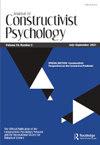A Foucauldian discourse analysis of president Duterte’s constructions of community quarantine during COVID-19 pandemic in the Philippines
IF 0.7
4区 心理学
Q3 PSYCHOLOGY, CLINICAL
引用次数: 2
Abstract
Abstract The novel coronavirus (COVID-19) first hit the Philippines in January 2020 and by March, more suspected cases were reported, compelling the national government to create measures to secure public health and fight the pandemic. In order to mitigate the spread of the virus, a community quarantine in the Philippine’s National Capital Region began on March 15, 2020. This study utilized Foucauldian Discourse Analysis in understanding President Rodrigo Roa–Duterte’s discourses about community quarantine during the COVID-19 pandemic in the Philippines. Two of his press conferences served as texts for discourse analysis: (1) on March 12, 2020 when he announced measures against COVID-19 threat, and (2) on March 16, 2020 when enhanced community quarantine was imposed. Results showed four wider discourses: (1) Community Quarantine as a Political Device, (2) Community Quarantine as a Protection of Public Health, (3) Community Quarantine as an Act against Resistance, and (4) Community Quarantine as an Opportunity for Bayanihan (spirit of Communal Unity) and an Expression of Damayan (Giving Compassion and Support). Results showed how the discourses transitioned from community quarantine to enhanced community quarantine. The results are discussed in relation to power and social change.菲律宾新冠肺炎大流行期间杜特尔特总统社区隔离建设的富科式话语分析
新型冠状病毒(COVID-19)于2020年1月首次袭击菲律宾,到3月,报告了更多疑似病例,迫使国家政府制定措施,以确保公共卫生和抗击这一流行病。为了减轻病毒的传播,菲律宾国家首都地区于2020年3月15日开始进行社区隔离。本研究利用福柯话语分析来理解菲律宾总统罗德里戈·罗阿·杜特尔特在2019冠状病毒病大流行期间关于社区隔离的话语。他的两次记者招待会被用作话语分析的文本,一次是在2020年3月12日宣布应对新冠肺炎威胁的记者会,另一次是在2020年3月16日宣布加强社区隔离的记者会。结果显示了四种更广泛的话语:(1)社区检疫作为一种政治手段;(2)社区检疫作为一种公共卫生保护;(3)社区检疫作为一种抵抗行为;(4)社区检疫作为巴尼亚汗(社区团结精神)的机会和达玛扬(给予同情和支持)的表达。结果表明,社区检疫的话语是如何从社区检疫过渡到加强社区检疫的。研究结果与权力和社会变革的关系进行了讨论。
本文章由计算机程序翻译,如有差异,请以英文原文为准。
求助全文
约1分钟内获得全文
求助全文
来源期刊

Journal of Constructivist Psychology
PSYCHOLOGY, CLINICAL-
CiteScore
2.40
自引率
0.00%
发文量
22
期刊介绍:
Psychology and related disciplines throughout the human sciences and humanities have been revolutionized by a postmodern emphasis on the role of language, human systems, and personal knowledge in the construction of social realities. The Journal of Constructivist Psychology is the first publication to provide a professional forum for this emerging focus, embracing such diverse expressions of constructivism as personal construct theory, constructivist marriage and family therapy, structural-developmental and language-based approaches to psychology, and narrative psychology.
 求助内容:
求助内容: 应助结果提醒方式:
应助结果提醒方式:


